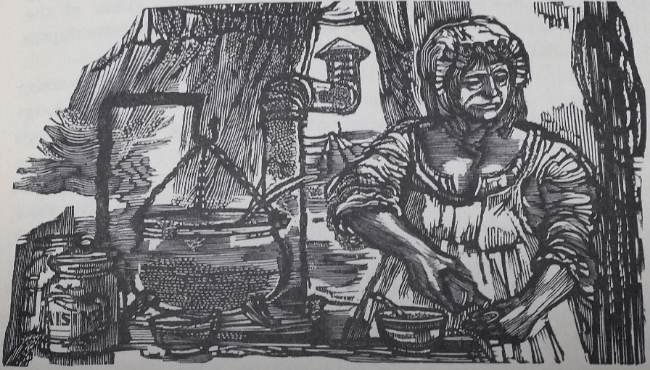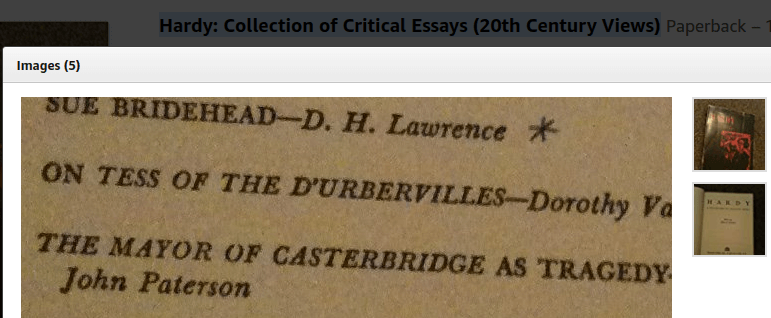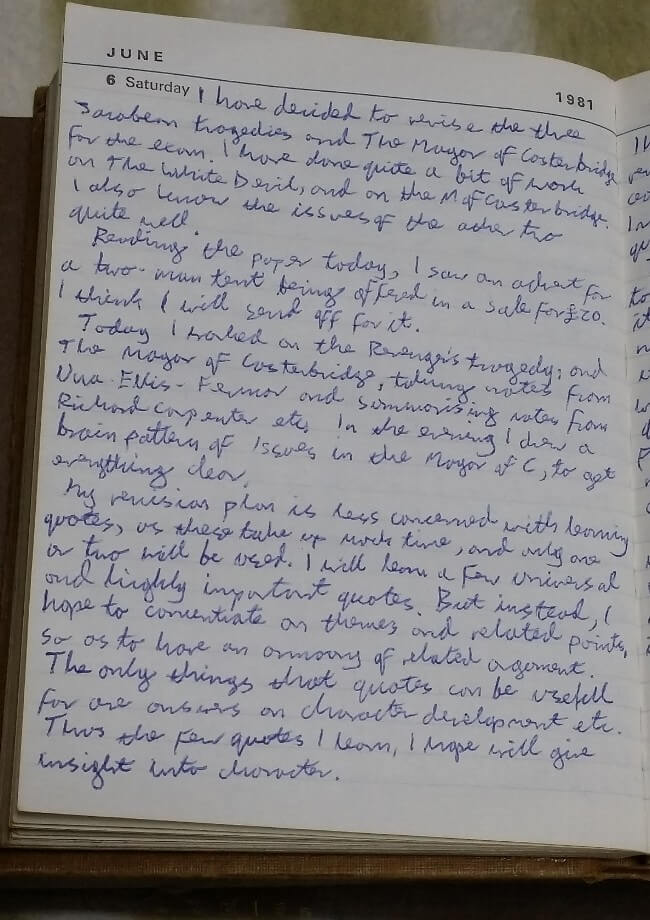
Back in June 1981 I was revising for my English Literature and Communications A-Levels. One of the books we’d been studying was The Mayor of Casterbridge and one of the quotations I learned by heart back then has stuck with me ever since.
The quotation is:
Henchard’s act of violence bears the same relation to the novel as the betrayal of Cordelia and Murder of Laius to Lear and Oedipus…
John Paterson, “The Mayor of Casterbridge as Tragedy,” in Hardy: Collection of Critical Essays (20th Century Views)
It popped into my head a couple of days ago and I decided to dig out my Collins 1981 diary to see if I wrote anything about it.
Henchard’s Act of Violence
In the first chapter of The Mayor of Casterbridge, Henchard the hay-trusser gets drunk on furmity laced with rum in a fairground tent and auctions off his wife – the “act of violence” that sets in motion the events that set in motion the tragic episodes of Hardy’s novel.
Drunk on Furmity? What’s that?
Not sure what furmity (also known as “frumenty”) is? It was a very common dish in ye olde days, a kind of wheat porridge. If you’re into traditional cooking, check out this video to see how it’s made:
Tracing the Source with Google and Amazon
I had completely forgotten whose essay I’d gleaned the quotation from, but it is easy to find out thanks to Google and Amazon.
It turns out to have been written by a certain John Paterson in his essay, “The Mayor of Casterbridge as Tragedy,” and I was pretty confident that I’d read it in the “Twentieth Century Views” book of Hardy essays. Sure enough, I was able to confirm that that was where I’d read it, thanks to Amazon.co.uk:

I think I owned a copy of that book for a while and that it was not one of the “total of 11 books crammed into an inadequate and collapsing carrier bag” that I borrowed from the West Kent College library on Wednesday 13th May 1981 in the run up to the exams.
Quotations, Themes, and Related Points
When I read Paterson’s essay, that quotation must have jumped out at me as a good one to learn.
According to my diary entry of 6th June 1981, I was less concerned with learning quotations (probably referring to quotations from the set texts rather than from critical essays) than with studying “themes and related points” in preparation for the second exam paper:
Saturday 6th June 1981

I have decided to revise the three Jacobean tragedies and The Mayor of Casterbridge for the exam. I have done quite a bit of work on The White Devil, and on the M of Casterbridge. I also know the issues of the other two [Jacobean tragedies] quite well.
Reading the paper today, I saw an advert for a two-man tent being offered in a sale for £20. I think I will send off for it.
Today I worked on the Revenger’s Tragedy, and The Mayor of Casterbridge, taking notes from Una Ellis-Fermor and summarising notes from Richard Carpenter etc. In the evening I drew a brain pattern of issues in the Mayor of C, to get everything clear.
My revision plan is less concerned with learning quotes, as these take up much time, and only one or two will be used. I will learn a few universal and highly important quotes. But instead, I hope to concentrate on themes and related points, so as to have an armoury of related argument. The only things that quotes can be useful for are answers on character development etc. Thus the few quotes I learn, I hope will give insight into character.
DH Diary 1981
Committing It to Memory with Trimeters
Well, I think the Paterson quotation fits the bill rather nicely. The reason why I remember it to this day is because I chopped it up and turned it into a verse of six lines of forced trimeters to remember for the exam:
Henchard’s act of violence | bears the same relation
to the novel as the | betray’l of Cordelia
and murder of Laius | to Lear and Oedipus…
At the time, Cordelia, Laius, Lear and Oedipus were little more than names to me. I knew two were characters from Shakespeare and two from Greek drama and I’d probably heard of the Oedipus complex by then, but that was all. Nevertheless, I went into the exam determined to insert that quotation into my essay come what may. And so I did.
A Levels and… a Two-Man Tent
It must have worked as I got a grade A in English Lit and a grade B in Communications, which was good enough to get me into the University of York the following year.
I have no idea whether I ordered the two-man tent or bought one from a camping shop, but I certainly bought one as my school friend “Boff” and I hitchhiked around England that summer and around Western Europe the following summer, camping night after night in my two-man tent.
DH
